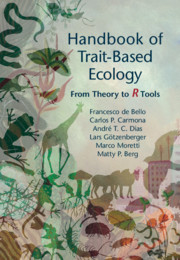Book contents
- Handbook of Trait-Based Ecology
- Handbook of Trait-Based Ecology
- Copyright page
- Epigraph
- Contents
- Preface
- 1 General Introduction
- 2 Trait Selection and Standardization
- 3 The Ecology of Differences
- 4 Response Traits and the Filtering Metaphor
- 5 Community Metrics
- 6 Intraspecific Trait Variability
- 7 Community Assembly Rules
- 8 Traits and Phylogenies
- 9 Effects of Traits on Ecosystem Processes and Services
- 10 Response and Effect Traits across Trophic Levels
- 11 Trait Sampling Strategies
- 12 Applied Trait-Based Ecology
- References
- Index
3 - The Ecology of Differences
Groups vs Continuum
Published online by Cambridge University Press: 08 March 2021
- Handbook of Trait-Based Ecology
- Handbook of Trait-Based Ecology
- Copyright page
- Epigraph
- Contents
- Preface
- 1 General Introduction
- 2 Trait Selection and Standardization
- 3 The Ecology of Differences
- 4 Response Traits and the Filtering Metaphor
- 5 Community Metrics
- 6 Intraspecific Trait Variability
- 7 Community Assembly Rules
- 8 Traits and Phylogenies
- 9 Effects of Traits on Ecosystem Processes and Services
- 10 Response and Effect Traits across Trophic Levels
- 11 Trait Sampling Strategies
- 12 Applied Trait-Based Ecology
- References
- Index
Summary
Chapter 3 provides an overview of the concepts and approaches needed to assess ecological and phenotypic differentiation between organisms. First, an historical perspective on earlier systems ‘classifying’ species in terms of their traits into different ‘types’ is provided. Second, other schemes such as the r/K continuum, the C-S-R scheme and the leaf economic spectrum are introduced. These approaches, aimed at defining different ‘types’ of organisms, are discussed in terms of their importance for interpreting ecological patterns and for communication with non-experts. A further distinction between response and effect functional groups is provided, with a guideline on how to define these groups with ‘a priori’ ecological hypotheses or ‘a posteriori’ data-driven approaches. The Gower distance is introduced as a useful way to characterize the differences between organisms in terms of multiple types of traits. At the same time, a number of often overlooked problems with this distance metric are discussed. The R material for this chapter illustrates these issues with practical examples.
Keywords
- Type
- Chapter
- Information
- Handbook of Trait-Based EcologyFrom Theory to R Tools, pp. 36 - 56Publisher: Cambridge University PressPrint publication year: 2021
- 1
- Cited by

